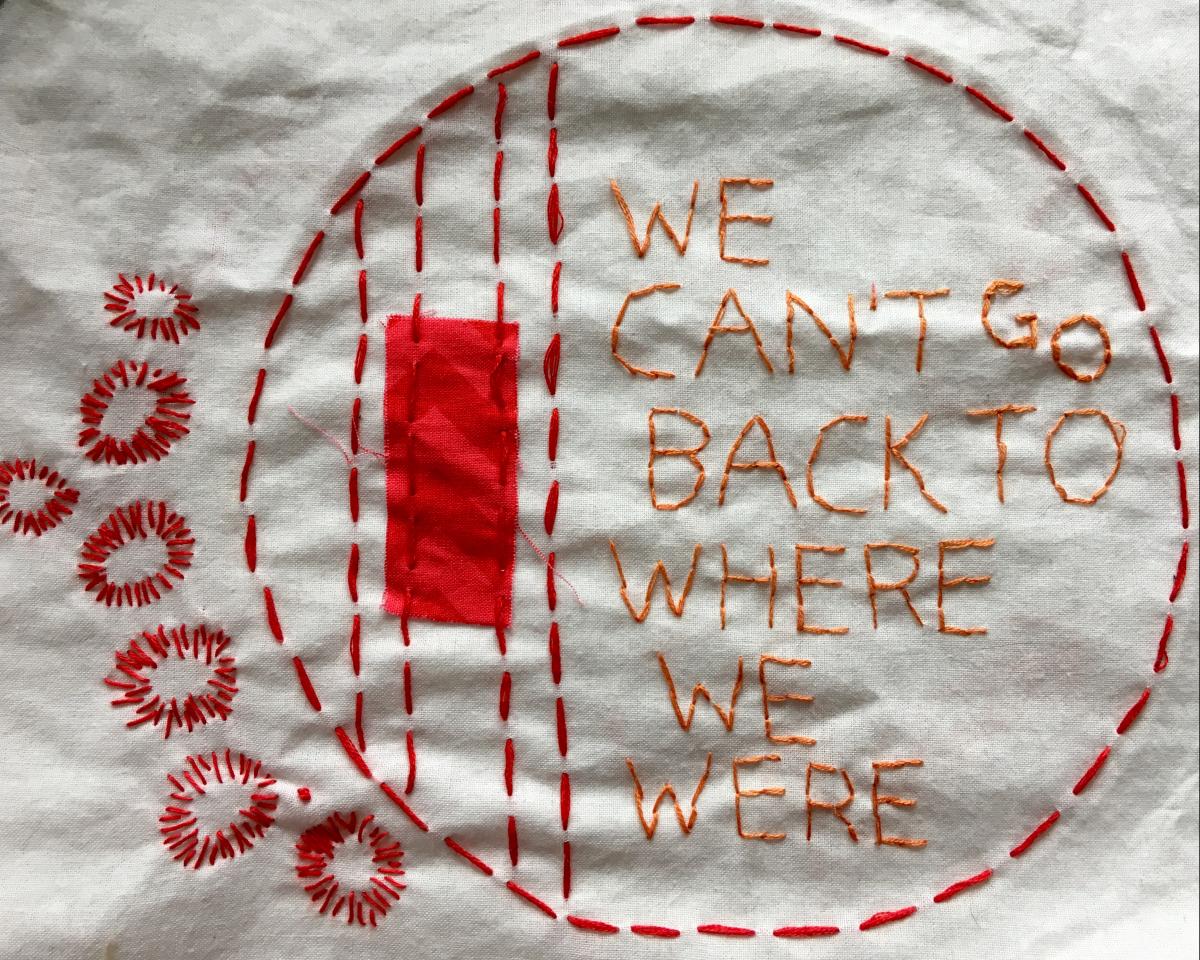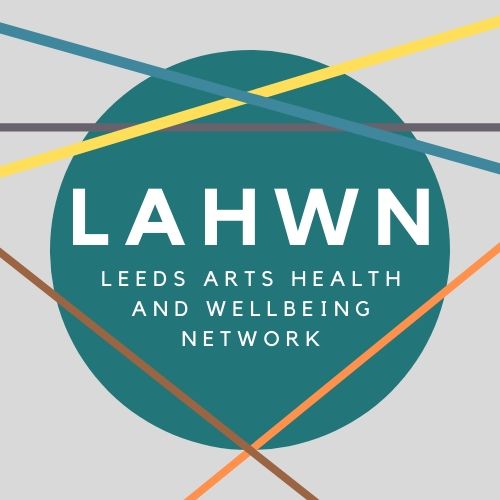
by Geraldine Montgomerie, Project Support Officer | Leeds Arts, Health and Wellbeing Network
I’ve always lived in Leeds so you’d think I could describe it in a way that meant you would see the city the way I do. Something about being in lockdown makes my brain feel a bit fizzy so that my thoughts and memories are a bit harder to access and express. It feels like so much has remained the same in my lifetime and yet I was standing on the rooftop of Leeds City College earlier this year, being reminded that many of the UK’s cranes are constantly changing our city’s skyline, working on Yorkshire’s tallest building amongst ever-growing workplaces and accommodation. It’s a city that I think of as properly Northern and I’m proud to come from Yorkshire but at least one in ten people are university or college students, often coming from outside of Leeds and we’ve had waves of immigration over the last century that influence how we live in the city from our business and architecture to our culture, with events like the West Indian Carnival an important part of our calendar in Leeds and across the North.
The Carnival is cancelled this year and it feels like much of our arts and culture is on hold, yet when I talk to community-based arts organisations they seem busier than ever. Our health and care services are recruiting and bringing in students into the workforce much earlier than planned and thousands of people are volunteering across Leeds postcodes to support their locality. Many organisations are working together more closely than ever before and in new and unexpected ways, with small private businesses giving significant time and resources in their community. The longer-term impact of the Covid-19 outbreak is unclear but speaking to NHS colleagues last week there was an understanding that we can’t go back to where we were.
Where my day job slots into all this is something I’m still working out, but the aim is to bring people together from across health and care, research and academia and arts and culture in Leeds. At the very least this network aims to raise awareness of how the arts can benefit health and wellbeing and find opportunities for more arts and health work to take place. Our members have also described key areas of work are to promote accessibility, impact, relevance and sustainability of arts and health projects. Perhaps talking through my week might help explain what I do.
__________________________________________________________________________________
My weeks can be about learning or strategy and planning but mostly they seem to be about bringing people together. As a part timer, I start my week on a Wednesday thinking about money… I’m reading about a £500,000 grant and wondering if it could apply to the arts, health and wellbeing network I work in and our members. It turns out it doesn’t apply to us but for a little while I did summon up the imagination to envision how this money would be spent. My first commitment is a video call to a university alumni team that works with foundations and trusts. I’m still picturing there’s half-a-million pounds available as I talk about what we need money for and what we would like to fund. It feels like there is some potential to support innovative art and health projects and we agree to revisit this with some specific funders in mind. Next I email Open Source Arts to revise an application for funding by Leeds Inspired, enabling people in the arts to adapt to Covid. We’re working together on an online micro-granting scheme to benefit emerging, disadvantaged and marginalised artists and I’ve had a realisation: why do I make things so complicated? We are scaling down our ambitions from a 6-month to a 4-month programme of activities and I feel a sense of relief as the application goes in.
I make a fortnightly newsletter: this week it focuses on help with digital inclusion, financial support, creative opportunities coming up and more survey questions on how people are affected. We need to keep asking about the changing impact of COVID-19 - it’s different from week to week – but online questions don’t feel like an effective way to learn what we need to know. On the other hand I have conversations about this through the week and there doesn’t seem a way to feed this back beyond anecdotes. I’ve been working with Leeds’ Digital Festival, which is about to launch online and I’m keen to highlight some of the upcoming events such as how technology can prevent a dystopian future. I get a swift response from Tim Sanders, commissioner for dementia, after I’ve sent the newsletter out, saying he’s enjoyed the content so much he’s shared the newsletter with colleagues and encouraged them to join the network. That seems to be how the network is building – through word of mouth – and I really appreciate the feedback.
One of my biggest catch ups on how things are going during COVID-19 is with Flavia who runs Get Away Girls, a nearly 30-year-old organisation that sees arts and writing as key to supporting the women and girls they work with. We talk for ages as small children we are caring for amuse themselves (mostly) in the room next to us and I make notes and get excited as I think of people who will want to work with and help launch the upcoming book “She Writes Too”. As we talk, I am drafting emails all over the place suggesting all kinds of collaborations, from workshops with Una Comics to the British Library’s “Unfinished Business” programme on the fight for women’s rights to the Light on Leeds podcast. I’m talking passionately about my excitement that the British Library are looking to move to the striking but somewhat decrepit Temple Works building in Leeds centre when I realise I’m going to be late for my next commitment.
I sign into the Zoom meeting - an early years music session by Make the Paint Dance just in time. They have been running a great project encouraging people around the world to record or imitate bird song that I have taken part in and promoted. I think it is great. For the early years session I sit with my four-year old singing along to live music and then dancing around with my arms flapping like wings. I think he’d rather be watching cartoons but after a few minutes he loses himself in the virtual aviary. Other parents have their videos off because they haven’t got dressed and I think what a good idea this is. Having video meetings can be really tiring.
In my own time, I curate a “Museum Window” of curious objects from around the house in response to a request from Leeds Museum. I’ve also been talking so much about the Thackray Medical Museum’s ‘Stitching with Lorina’ sewing and creative writing project work that I find myself embroidering words and quotes from people I have spoken to in health, art and community work, that I relate to my experience of Covid-19. If I ever finish this, I plan to submit it to the Museum for their reopening exhibition.
As I’m sending some pictures from an instrument-themed mosaics project (a collaboration between an artist, musicians, adult social care and Leeds museums) to the Arts in Care Homes project, I realise I’m due to make a phone call. It’s been a while since I’ve properly spoken to Cassy Oliphant, a community-based artist from the Creative Mothers Project, which creates exhibition opportunities for mothers and support events. I’m talking through the logistics of the microgranting scheme I’m creating for people she works with and she is telling me about Pyramid of Arts' virtual art exhibition of artists with learning disabilities. I’ve been talking with a memory support worker about putting together work made by people living with dementia and working with junior doctors to exhibit art made by health professionals and wondering if we should have a permanent online arts and health showcase. Having looked at a few online exhibitions this month, there is something about moving through their three-dimensional space that really helps me see the relationship between the art works.
I also catch up with Keziah at Mafwa Theatre about how the micro-granting scheme might work to benefit the refugees and asylum seekers they work with. We have a great conversation about their activity packs that they are posting throughout the COVID-19 outbreak and I talk about a mini playbox scheme created by another theatre company in Leeds (Fall Into Place) that I think could be extended across the city.
I end the weeks work talking to Alice Gilmour, who works in promoting accessibility at Opera North and who is currently co-ordinating Arts Together Leeds – a group of art and community organisations supporting each other. We are talking about whether they are accepting new members – I can really see the Get Away Girls benefiting from joining - and the answer is YES. We talk about how Arts Together Leeds have supported Mafwa Theatre with funding to make the activity packs – I wondered about this but didn’t ask. We talk about supporting our colleagues to stay well and how we’re coping with Covid-19; some days are better than others but personally we seem to be doing okay… however when we talk about the impact on the arts and culture - from the freelancers without work and the cancelled productions to the theatres and galleries with most of their staff furloughed – it’s hard to see how we will come out of this unscathed.
__________________________________________________________________________________
It’s not just the arts though. It’s the impact on our colleagues in health and care, often working under greater pressure than ever before. It’s the impact on our colleagues in universities, working to move courses online, managing the uncertainty facing graduates and freshers alike and anticipating huge reductions in foreign students. Whether Leeds will remain home to so many students is unclear and I can’t help but question what this means for the skyline with student accommodation being one of the things those cranes were needed for… but my weeks show me the potential in this uncertainty for change, for collaboration, for envisioning another future in which the needs of our critical workers and our communities are prioritised.
__________________________________________________________________________________
Geraldine can be found talking about the network in COVID-19 outbreak for the best part of an hour on podcast Light on Leeds.
Our website, somewhat hurriedly reconstructed in response to coronavirus, can be found at www.lahwn.co.uk
Membership of the network is encouraged – particularly if you have something to offer or ask - or if you would like to receive our newsletter to stay on top of arts and health news with a Yorkshire flavour bit.ly/joinLAHWN
LAHWN exists across social media platforms but is most active on twitter @LeedsAHWN

